#also triangle strategy is ok for a working title
Explore tagged Tumblr posts
Text
Callig your game Bravely Default is too brave.
Dial it back.
1 note
·
View note
Text
TGF Thoughts: 3x09-- The One Where The Sun Comes Out
This episode was way more engaging than the last. I talk a lot about Maia in this one; the writers finally figured out how to use her!
Reasons I shouldn’t write recaps after a year without seeing an episode: I forget basic stuff, like that it rained for all of season 3. You know, because ATMOSPHERE and WEIRDNESS and QUIRK. And SYMBOLISM. Can’t forget symbolism.
To be fair to the writers, it did rain a lot last year. All I remember about the month of June is rain. They predict everything.
Maia’s new job at a call center (I can’t recall if we’d seen her at the call center before this episode) is something she takes very seriously. Just kidding. She acts disdainful towards anyone who dares ask for her help and then hangs up on them. On one hand, this seems like a terrible job so I get her “fuck it all” attitude. On the other, she’s being suuuuuper bratty.
Right. I refreshed my memory. We did see Maia at this job in an earlier episode.
Consult-a-Lawyer is where all the LGwhatever rejects go. Sounds miserable.
Blum walks in, and Maia makes a, “Oh God, THIS asshole” face. Coincidentally, this is also the face I’m making as I realize I’m going to have to listen to this loud man I had blocked from my mind yell obscene things for two more episodes.
Blum wants to hire Maia. She agrees, as does her friend Lili. I believe Maia has other choices (remember how she turned down Diane’s offers to help when they weren’t exactly what she wanted?) but also, yeah, I’d want to get the hell out of Consult-a-Lawyer too.
Now it is hailing. Everyone from RBL is in blue. Remember those picspams we all used to make where we’d oversaturate the background to make everything blue? I wouldn’t need to oversaturate this image to make the blue pop.
I truly don’t understand why the main page of All Access thinks I am in the middle of some random season 2 episode when I am clearly in the middle of 3x09. When I click on the show, it understands that I’m in the middle of 3x09 and allows me to resume watching. Why wouldn’t you optimize your homepage to encourage people to keep watching!? (All Access isn’t alone in this: HBO Go also makes it very hard to figure out where I left off when watching a series.)
So, because Carl Reddick was a sexual harasser and RBL covered it up, ChumHum is insisting on an internal investigation, led by a woman who is-- you guessed it-- quirky. And even worse, it’s one of the quirks that’s actually not funny because it’s a real condition people live with?? How are we still doing this, show?
This is RBL’s best year ever. Yay! I forget if that tracks with anything we’ve seen. I guess the existence of ChumHum alone is enough to make that true.
Oh NO, Book Club is in this one too!? Liz, wisely, says she’s done and refuses to go with Diane.
Maia tells Blum no, she won’t work with him. She thought he was rescuing her from hell, but he’s really “dragging her down deeper.” This is accurate. Maia may not be the smartest character on this show, but she’s got her eyes wide open when she works with Blum.
Blum wants to work with Maia (duh) because her father is a piece of shit respected by other pieces of shit. This checks out. This is quite logical, tbh.
Maia requires very little convincing. This is not because she is in such a hard spot she has no other options. This is because she is bored and hates the world because she didn’t get her way and had to deal with consequences. It took very little to turn Maia from an innocent to a villain. Perhaps that’s because she was always complicit. (If you’re 26 and went to law school and you can’t understand privilege even on the most basic level, it’s because you’ve been tuning out everything that challenges you.)
Maia seems way more confident now. She’s SO much more fascinating as a villain than as a protagonist, likely because even when she was the protagonist everything she did was so selfish it was hard not to see her as a villain. Props to the writers for recognizing that and leaning into it. They don’t explicitly tie her actions here to her actions at the start of the series, but this only works because Maia’s always been one slight away from going bad.
And yes, I think villain is the appropriate word for someone money hungry and willing to work, no questions asked, with someone as slimy as Blum.
Maia hires her friend Lili to help out, which, admittedly, is a nice thing for someone I just called a villain to do.
After further “messages” from the con artist who started Book Club, the Book Clubbers want to SWAT someone. This sounds fucking terrifying. Diane pushes back and the rest of Book Club is totally ok with this strategy.
So Diane reveals that Valerie’s a con artist and it causes squabbling. It somehow backfires because people believe the woman claiming to have a message from Valerie. Even the one who can do all the IT things--the one who could very easily (by show logic at least) just simply look up the records and phone numbers herself-- believes her.
Is a big group setting really the way internal investigations are done? I’m no expert, but this feels like a bad approach!!
Marissa doesn’t think the firm has racial issues! Ha ha. She thinks the racial pay gap issues are totally resolved because the associates got raises. As much as I want to believe someone as savvy as Marissa wouldn’t think like this… I kinda believe it.
Lili also seems kind of terrible, like someone who can’t wait to go on a power trip and fuck over every person who has ever said anything mean to her.
Oh goodie, we’re talking about sexism now. I appreciate that they’ve featured a few associates over the course of season three. I don’t remember their names since I last watched these episodes a year ago, but I remember that they’ve been in several episodes. I hope to see them in season four, and to learn their names.
Someone says men weren’t considered to head up Lucca’s department. This is blatantly false. Also, idk what these other associates can do, but Lucca’s proven herself to be adaptable, smart, and someone who can go above and beyond. Plus, she is someone who is out for herself, with tons of career options. She’s someone you want at your firm.
The female named partners are biased against men, says a (you guessed it!) male associate. Hahahahahahahahahahahahahhahahhahaha no.
Marissa calls the associate out on this, and another (female) associate steps in to say she’s in no place to talk since she’s stealing Jay’s job. If it didn’t seem like there was room for both of them, this would be true.
In a move I appreciate, the mailroom employees are also in this scene, talking about how they didn’t receive any bonuses to correct for the pay gap because of their class. When one of the associates says they didn’t receive a bonus because of race, a mailroom guy calls her out for not knowing his name.
And then it devolves, as so many of these scenes do, into people talking over each other.
While I like that they address these issues so often on this show, I don’t think “inequalities are controversial and there’s no solution so here are people talking over each other” is the best approach. Sure, I can appreciate different points, and I don’t need the show to tell me how to think, but at this point I think the show needs more of a POV on this. It feels, too often, like they’re saying “Controversy! Huh!”
Marissa goes to Liz and mentions the other women Carl Reddick assaulted. Liz, understandably, hasn’t looked at the files Marissa gave her. She says she will but asks Marissa to keep quiet around the investigator. So sounds like she doesn’t intend to do anything.
Oh no. Is this the ep with the retcon where Liz and Adrian actually did hook up!? And put it in work emails!? All I have to say about this is that it’s a bad decision. Sometimes the writers get so close to making a bad decision and then walk it back enough so that I can relax, and then bring it back later, for no reason. It’s even worse that way, because by that point I’ve already formed a strong opinion about it happening. The moment that set me off the most in TGW was when Alicia and Peter agreed to renew their vows at the end of 421, followed by a commercial break, followed by a promo with Alicia kissing Will. I HATED the love triangle at that time. I mean HATED. That commercial break allowed me to relax into the idea that the writers had ended the love triangle. The promo shattered that idea, and, in turn, I slammed my computer shut so hard it nearly broke. That is not a feeling I like. That is the feeling that learning Liz and Adrian fucked gives me.
NOT EVERYONE HAS TO SLEEP WITH EVERYONE. IT IS SOMETIMES MORE INTERESTING WITHOUT THE ILLICIT AFFAIRS. THERE ARE MORE INTERESTING WAYS THAN HOOKUPS TO ADDRESS THAT THEY USED TO BE MARRIED. For starters, can we get an episode where Liz calls Adrian out on the condescending voice he’s always using when he talks to her?
Oh yes, this is also perjury. Why. Why is this happening? Why would Liz and Adrian admit this to an investigator knowing damn well they lied under oath, and also, why would they lie under oath? I know we saw it happen but was it really worth two partners perjuring themselves bc they fucked their ex???
When the stakes are high for no reason (or for a stupid reason) it doesn’t maximize drama. It just makes me tune out the drama. If I believed Liz and Adrian had a good reason to perjure themselves, maybe I’d care about this. Maybe they did. But the fact I don’t remember it-- and I’m someone who can name every single episode title of TGW in order-- suggests to me it wasn’t a good enough reason.
Liz goes to shred the file with the rest of the info on her father’s victims. See, this is a bad choice that I understand. It’s her father’s legacy and her firm’s future, and she has all the power right now. It could come back to bite her, but I get why she takes this risk. I get why this situation is fraught.
Credits time!!!
Maia’s also decided to dress like a Bad Girl. She is trying VERY hard. But she’s pulling it off. She’s speaking without hesitation and actually taking an active role in getting things done. It speaks volumes about her character that the first time she’s been motivated about anything work related, it’s something morally bankrupt.
Apparently the black and white associates are sitting apart from each other. Julius says it’s not intentional; there’s a hot desk system. That held up well.
LMAO people think Julius and Marissa are sleeping together. Julius does a spit take-- the appropriate reaction.
“You’re really a Rindell?” a potential client asks Maia. “Raised at his knee. Taught me everything he knows,” Maia says proudly, displaying a framed picture of her and her father. I’ve said it like five times already but it’s SO dark that Maia would use this to her advantage. We’ve seen some opportunistic shit on TGW/TGF but Maia gets so shameless, so fast, with no remorse. Damn.
RBL is trying to disbar Blum. He doesn’t care. He tells Maia to take care of it and to use the allegations (which she doesn’t realize are real) against Carl to make it go away.
Diane is talking to a computer. I’m over all the Diane plots.
Liz is glad the Book Club is still fighting even if she’s not involved, which is the stance it always made the most sense for Liz to have.
Diane allows Book Club to proceed with their latest scheme because she finds the dude they’re targeting deplorable. If this plot didn’t involve Book Club I’d find it to be an interesting moral dilemma.
An actually interesting dilemma: Liz informs Marissa she will not be disclosing the names of any additional victims. Marissa clearly thinks this is the wrong call but keeps her mouth shut. An unusual amount of restraint for her.
Maia and Marissa are still friends! Is this the episode with the bizarre Maia/Marissa kiss that I still don’t understand the point of?
Marissa divulges info about the firm’s Reddick drama to Maia, which is uncharacteristically stupid of Marissa. But there’s no bridge Maia isn’t willing to blow up to help Blum. She’s prying and manipulating a friend who faked a drug test for her and got her through the worst time in her life so she can prop up a mean, cruel man. There are other paths for Maia. I want to be absolutely clear that I think she is choosing this one because things got the slightest bit challenging for her.
Maia realizes what she’s doing and stops herself saying she has to go because “everything we talk about from now on, you’re gonna blame me for.” And rightfully so!
OH, the kiss is because Maia is acknowledging she’s fucking over their frendship, isn’t it? Earlier they’re about to drunkenly kiss and one of them talks about not fucking friends they don’t want to fuck up the friendship. So the kiss is fucking over the friendship. Or maybe it’s just a kiss.
“You’re gonna hate me. Just remember, this has nothing to do with us,” Maia says. Ha, I believe this less than I believe Alicia’s “this was never meant personally” in 5x05. (Hitting the Fan isn’t a bad comparison here, since Alicia does make a choice to fuck over friends when she has the choice to not fuck over friends. I think what makes that “gray” for me while this is villain territory for Maia is how fast this happens. Alicia’s taking the clients whose accounts SHE has sustained, and starting a firm she truly believes will be better (for herself, as a company, for her family). It’s a selfish decision. Her options aren’t reduced all that much either (she’s the governor’s wife, if she wants to leave her firm she could go anywhere). But I can see her side, I can see how fraught the choice was for her, I can see how the way things played out made the tensions worse. Maia burns her friendships to the ground so she can work with a loathsome man because the opportunity fell into her lap while she was hating the world too much to do anything productive with her life.
Maia’s crying in the office when Blum finds her. She knows what she’s about to do. She’s sad she’s going to do it, but she knows she’s going to do it. I don’t think she considers, for a moment, not fucking over Marissa. As soon as Marissa gives her the intel (which, no matter what Maia says, she was totally fishing for), Maia’s mind is made up. Does it make it better if she cries about it?
And Maia KNOWS it is a betrayal. She says she knows “a friend will interpret it as a betrayal” because she knows it is one. She tells Blum she doesn’t know if it’s a betrayal because “I’ve lost track these days” (that line sounds surprisingly Alicia-esque) and tells him what she knows. That’s one of those questions that if you have to ask, you know the answer.
Thought experiment: Would it be a betrayal if Maia were an activist who wanted to get the word out about an abuser? I think a lot of why I react so harshly towards Maia’s choice here is that (1) she sees it as a foregone conclusion that she’ll use the info and (2) she is using it to help Blum. Blum isn’t shades of gray (50 shades of gray joke here). He is despicable. He isn’t morally ambiguous and you can’t even say his ends justify his means because his ends are despicable too!
Ah, a scene I won’t have much to say about. It’s going to be Blum on his bullshit.
Oh, I do have something to say, but it’s a sad thing. Mark Blum, the actor playing ACDB lawyer Julius Kreutzer in this scene, sadly passed away from COVID-19 last week.
Roland Blum representing sexual assault survivors to fuck over a rival law firm makes me sad.
Marissa does, in fact, interpret Maia’s actions as a betrayal. She calls her immediately and asks, “you fucked me over?” “Not intentionally,” Maia says. Oh, own it. You knew the moment she said it what you were going to do; this was an intentional action with an inconvenient consequence.
The partners find out, thanks to Blum, that Julius is going to be a federal judge. And they are not happy.
More talking over each other! Cultural appropriation has entered the mix of complaints. Lucca decides to intervene by going to the partners about the new seating plan. And this is why Lucca, and not that associate, is heading up a department. She knows when to go to management and isn’t wasting her own time in these squabbles. (Tbh, Lucca recognizing that bickering with no resolution in sight isn’t productive makes me wonder if the writers have more of a POV than I’m giving them credit for. Maybe they’re trying to say that talking over each other is futile and aggravating.)
Why the hell does this investigator want to integrate the mailroom by firing black people so they can hire more white people?! Setting aside for a minute that that is a profoundly stupid idea, that can’t possibly be legal, can it???
RBL decides that, backed into a corner, it’s time to just own up to their wrongdoings. It works with the ACDB, at least until Blum brings Maia into things.
Book Club kills someone. I truly don’t know how to feel about Diane having literal blood on her hands. This scene should be way more dramatic than it feels. This is the problem with having stakes too big for the show. Instead of getting invested, I write off the far-fetched plots, and I can’t really care about character drama that stems from something so over the top I don’t believe it.
Diane thinks Book Club didn’t want the guy dead. What about this group that was working to hack voting machines suggested that they wanted him to live????
Liz says Diane has to report them, but Diane worries she’s implicated. Who could have imagined that working with crime-loving resistance group would have legal ramifications?! It’s not like Diane and Liz are lawyers or anything.
Liz thinks Diane needs to convince Book Club that everything they’re doing is because of a con artist, but that’s a solution to a different problem. Diane knew Valerie was a con artist and still pushed forward with Book Club because she was committed to the cause. Why would any of these other women abandon the group at this point? What difference does it make if Valerie is a liar.
Shock of all shocks, Book Club is planning their next attack. It’s almost like they are a group of criminals who meet in shady spaces at odd hours. The time to be noble about this shit was weeks ago, Diane and Liz. You’re complicit. What did you think you were getting into?
Book Club does not like that Kurt is conservative. Diane gets mad and basically threatens them.
“You two are just as culpable,” one of the Book Clubbers says. She’s not wrong. Maybe not JUST as culpable, but culpable for sure. It’s possible that I just don’t want to see Diane and Liz be culpable for things this atrocious and stupid so I resent this plotline. (That said, to go back to Hitting the Fan as an example of a character I love doing a thing that is morally questionable at best, I can accept my faves doing things I don’t like. There’s something about the scale of Book Club’s actions vs the scale of the show that feels off.)
“The truth is what you make it,” Blum tells Maia. A familiar lesson for this show.
!!!!!!!! Is CBS reading my unpublished word doc?! Because today All Access understands that I am watching 3x09.
It’s also updated the key art for TGF to the season 4 image, which says “What is memo 618” in larger font than the show’s title. I am sure I will come to care about memo 618; however, it doesn’t make me want to watch the show or tell me anything about the show, so I don’t get why it’s on the poster.
ALSO there is no question mark on the image so that’s gonna drive me just a little crazy.
Blum manipulates Maia by telling her she shouldn’t let anyone control her. Maia doesn’t agree to help him; she heads home instead.
Liz and Adrian talk about sleeping together. They had previously said it was a mistake, but Adrian wants to reopen the discussion. All Liz wants is privacy.
Adrian then asks her if she regrets “fucking”. Yes, he says fucking. Those are his words. Liz is like, what do you want to hear? And it breaks up the tension of the moment. THAT is more compelling to me than all the perjury stuff. (Also, neither of them regret it.)
I don’t think I have a problem with them sleeping together… just a problem with it happening off-screen (I don’t need a sex scene-- just want to know how they got there!), being retconned, and then being used to create drama. If they want to hook up, go for it.
Oh, look, it’s a stock footage shot of the outdoors. Busy streets? People walking around? Seems fake.
The stock footage is to show that the rain has stopped, btw. It just feels like it’s designed to taunt me with the idea of public parks and bustling streets.
The ChumHum report is out and the partners look very! Serious! But Liz and Adrian are in the clear.
The investigator basically just finds the firm grew too fast and that’s their only real issue. The Carl Reddick issue will hurt, but it’s survivable.
But they’re still losing ChumHum. They were always going to lose ChumHum. Diane goes outside to enjoy the good weather while she can.
Maia doesn’t show and Blum gets disbarred. It’s fun to watch him squirm, having just lost his power. He rambles nonsensically.
Maybe Maia isn’t a villain. I truly don’t remember this scene happening; I thought I remembered her showing up to defend him! Score one, Maia. This episode is the most interesting Maia’s ever been.
I also don’t remember Diane singing on a park bench. But I like it!
Book Club is threatening Diane now. They’ll destroy her (or kill her?) if she tells on them. Dramatic!!!
#the good fight#tgfthoughts#yall i had to actually spend time THINKING about why maia's choices come across differently than similar choices by other characters#a maia plot made me think about something other than how little she works!! truly incredible
2 notes
·
View notes
Text
How the Raptors defense is making other teams see ghosts
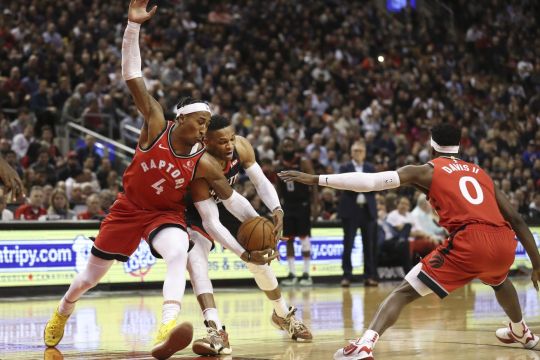
Richard Lautens/Toronto Star via Getty Images
Zone defense, man defense, full-court press, half-court trap, it doesn’t matter. The key to the Raptors’ success is their unrelenting pressure.
Picture yourself on a haunted house ride at your favorite amusement park. You’ll be spooked by pop-out faces, fluorescent lights, and ominous sounds, but you don’t know exactly how, where, or when they will hit you. Intellectually, you know there’s nothing to really fear and you’ll eventually finish the exhibit unscathed. But as soon as you enter that front door, those rational thoughts give way to base fears that you can’t escape. You scream. You yelp. You gasp. You lose your nerve. You’re scared shitless. And you forget, for a brief moment, that the ride is all an illusion.
If this experience describes one you’ve had before, congratulations. Now you understand what it’s like to go against the Toronto Raptors’ defense, and why so many skilled teams and star players look shockingly out of their depth when they try.
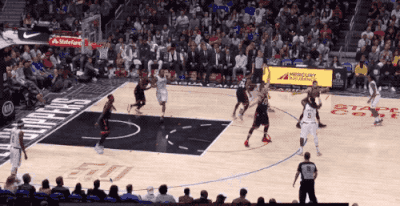
You also understand why the Raptors have responded with even more vigor after losing the star that carried them to last year’s NBA title. Toronto was expected to slink back into the league’s middle class after losing Kawhi Leonard in free agency. Instead, the Raptors are two games better off than they were at this time last year and riding a 15-game winning streak, the longest of any Canadian professional sports franchise ever.
They constantly snatch victory from the jaws of defeat, no matter who’s healthy enough to suit up. The most recent example: a one-point win over conference rival Indiana in which they scored 11 straight points in the final 2:25. After watching Indiana calmly move the ball and nail scores of open threes for 45 minutes, the Raptors dialed up their pressure, deployed a full-court press, and watched the Pacers wilt.
youtube
It wasn’t the first time Toronto used unconventional methods to take teams out of their comfort zone. They deployed that same full-court press to devastating effect to overcome a 30-point third-quarter deficit against Dallas. They held LeBron James to 13 points on 5-15 shooting in a win in Los Angeles, flummoxed Damian Lillard into a 2-12 night with a mix of box-and-one and triangle-and-two zone defenses, and didn’t even let Joel Embiid score a single point in a November victory over Philadelphia. Their aggressive double-teaming of James Harden in a December game against the Rockets inspired other imitators and played a role in Houston’s decision to go all-in on small ball. Turns out the box-and-one they famously deployed against Stephen Curry in last year’s NBA Finals was merely a precursor to the “janky” defenses they’ve effectively rolled out this year.
Toronto’s adaptability is attributed to second-year coach Nick Nurse, an innovative basketball tinkerer willing to try many different defensive alignments. Nurse is indeed a creative soul, and his nonchalance at the possibility of embarrassment inspires buy-in from his players. Toronto’s roster is stocked with athletic wings and some of the smartest veterans in the league, the ideal mix to carry out Nurse’s experiments.
But ingenuity and intelligence only succeed when they’re used in service of a common purpose. That goal for the Raptors is simple: create a feeling of constant pressure that scares otherwise-poised players shitless. Zone or man, full-court or half-court, 2-3 or box-and-one, trapping or switching, hard double-teaming or softer digs down, the point is to facilitate the same kind of base fear one gets when riding a haunted house exhibit. They make you see ghosts.
“Constant pressure” does not mean sprinting directly into ball-handlers’ faces. The Raptors do attack the ball sometimes, with targeted surprise traps at opportune times. D’Angelo Russell certainly wasn’t ready for this.
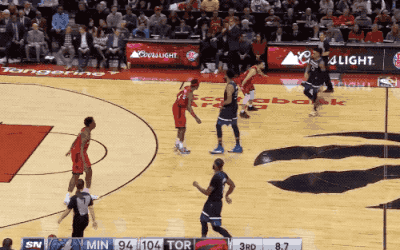
But these frontline maneuvers are useless if the back line of defense isn’t moving in concert to shut down potential outlets. Every team strives to cut off drives to the basket, but the Raptors commit to the cause with all five defenders sinking deep into a shell, on or even before any move to the basket. They have two goals: clog precious driving space and cut off the most obvious escape routes a ball-handler might use when they draw multiple defenders to them.
When they accomplish both, they force offenses to be indecisive. That’s when they pounce.
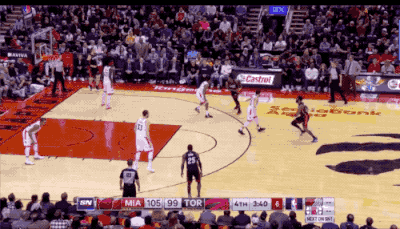
To make that style work, Raptors’ extra defenders don’t actually go directly to the ball. Instead, they anticipate where the offense wants to take it and position themselves to stand in the way, or at least in the vicinity. Get past one guy, and a second is already in position to replace him while a third lurks nearby.
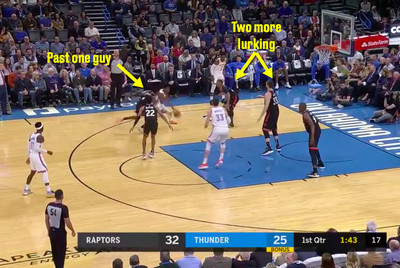
Every player must see the big picture to make this five-man strategy work. Luckily, Toronto’s roster is stocked with players capable of doing just that. This is not a group that gets tunnel vision on their own matchup. Instead, they happily block off potential driving lanes, as if they are human banana peels.
One downside to a collective paint-packing approach is that it leaves the perimeter relatively unguarded. The more compressed the shell, the more room for offenses to suck the defense in and deliver kickout passes for open jumpers. The league’s three-point revolution, in theory, makes these drive-and-kick easier to execute, not to mention more valuable on the scoreboard.
To solve that problem and maintain their pressure anyway, the Raptors do two things that most teams don’t.
One is that they close out incredibly aggressively to open shooters, often to the point of looking reckless. They don’t merely run shooters off the line. They catapult them off it.
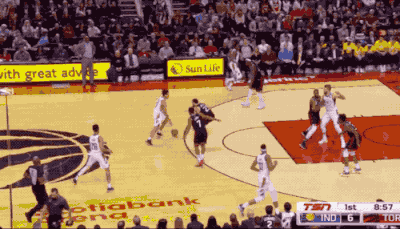
This is a high-risk approach because a simple shot fake gives the offense an odd-man advantage. It can often look undisciplined and silly, so I wouldn’t recommend coaching your youth team this way. But Nurse and the Raptors find a way to make it work with their personnel and commitment.
How? Stack up enough help-and-fly recovery sequences, and suddenly the offense is wasting precious time trying to find a perfect shot that doesn’t exist. Every additional decision the offense must make to avoid or shoot against a flying closeout is another chance for them to mess up and/or hesitate due to self-doubt. Toronto gets so many “coverage sacks” like this because they force opponents into endless drive-and-kicks that don’t go anywhere and mentally drain them.
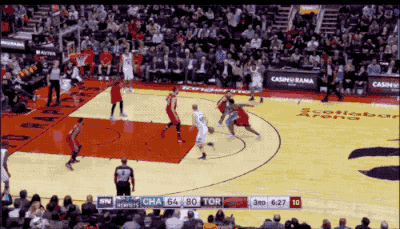
Every Raptor plays an instrument, but Pascal Siakam is the orchestrator of the Raptors’ closeout crescendo. He is so fast, long, and versatile that he spooks potential shooters the second he surges toward them. Per NBA.com tracking data, Siakam contests six three-point attempts per game all by himself, the most among players with at least 25 games played by a wide margin. Because he can guard all five positions effectively, opponents never know exactly where he might be on a given possession. And because the Raptors’ system is so well drilled at rotating down early to stop drives to the basket, Siakam is free to run at shooters all over the court without worrying about getting beat on drives.
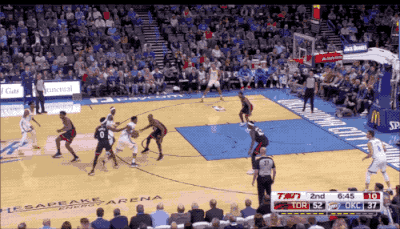
The other key is that the Raptors’ five players switch seamlessly in scramble situations to lessen the distance any single player must travel to get back in position. Most teams have mastered the art of the “scram” or “kickout” switch, a maneuver used to prevent offenses from exploiting big-vs.-small mismatches inside. (Here’s a good breakdown from 2017).
The Raptors use the same principle, but on the perimeter. Rather than scram switching to stop post mismatches, the Raptors scram switch players of all sizes to shorten the distance needed to close out on shooters or stop drives. Watch Fred VanVleet pick up Patrick McCaw’s man on this Pacers curl.
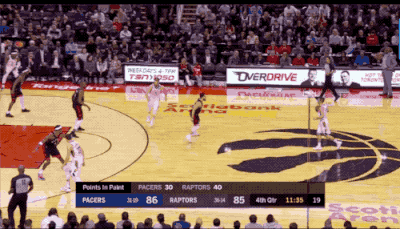
Or Rondae Hollis-Jefferson boot McCaw to his spot-up wing assignment to cut off Caris LeVert’s drive.
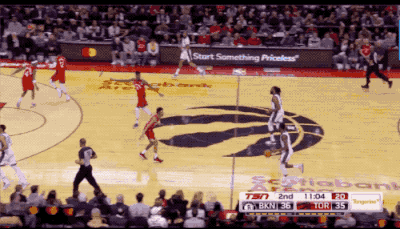
Or Kyle Lowry and Serge Ibaka covering for each other on two straight Thunder spot-up drive attempts.
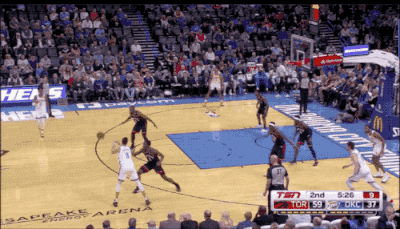
Collectively, Toronto’s frantic closeouts and quick-thinking switching make opponents feel pressured in moments where they should feel comfortable. Shots that are objectively “open” against Toronto often feels like they’re too contested to take, but when opponents choose to drive instead, they’re bound to find someone unexpected cutting off their path before they even get started. Their only choice is to restart the process with another drive-and-kick that hopefully yields a less stressful situation for a teammate.
Sometimes — nay, often, it does, but Toronto’s OK with that. This seems counterintuitive on many levels. Historically, the league’s best defense are the ones which limit three-point attempts rather than three-point percentage, because they have much more control over the former than the latter. Yet four out of every 10 Raptors opponents’ shots are threes, the highest rate in the league. More significantly, Toronto yields the highest proportion of corner threes in the NBA, according to Cleaning the Glass, and the difference between them and 29th-place Miami is larger than the difference between the Heat and 10th-place Detroit.
If the goal of a defense is to limit high-efficiency shots, Toronto’s would fail spectacularly. Cleaning the Glass uses a metric known as Shooting Location Effective Field Goal Percentage, which estimates how well an opponent would shoot if they converted the shots a defense gives up at a league-average rate. Based on this, Toronto’s defense should surrender an effective field goal percentage of 53.7 percent, the sixth-worst mark in the league. Instead, the Raptors actually hold opponents an effective field goal percentage of just 50.8 percent, mere percentage points behind Brooklyn and the Clippers for the second-best mark in the league. Since 2014, only two other teams (the 2016-17 Warriors and 2017-18 Celtics) have maintained a wider positive disparity between those two numbers over a whole season. Usually, those large discrepancies indicate good fortune and stabilize over time.
But there’s a growing case that Toronto is actually the exception to this rule. Teams may get juicy three-point looks against them, but only after surviving what seems like a never-ending a gauntlet of closeouts, switches, and traps. This shot is “open” in literal terms, because there’s no defender in sight.
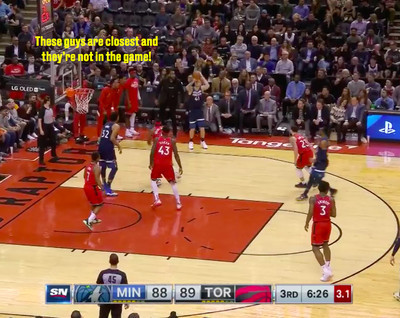
But in the same way an unexpected tap on the shoulder gives you anxiety, this shot seems more contested than it is because the Raptors’ constant pressure screws with the shooters’ senses.
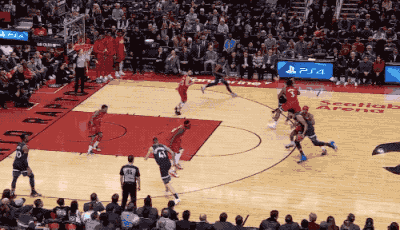
Those numbers also don’t account for the many “open” shots teams pass up, only to turn the ball over because they feel the Raptors’ footsteps. Toronto is second in the league in live-ball turnovers, second in points off turnovers, and tops in most points added per 100 possessions via steals. They strike quickly off the many mistakes they force, which only stresses their opponents out even more.
Nurse’s deployment of a shapeshifting defense with pressure as the foundational principle is unconventional and creative, but hardly unprecedented. In the early and mid 1990s, the Seattle SuperSonics emerged as a defensive powerhouse using Bob Kloppenburg’s “SOS” system, a frantic style of play that was often seen as a gimmick by its detractors. Among the core tenants of the system: switch all 2-on-2 screens, defend each action with all five guys, and force opponents to vulnerable “checkpoints” on the court before turning up the heat.
This system, combined with the Sonics’ athleticism and quick-strike ability, helped them overcome their lack of size and probably should have yielded a title. It looked bad when teams managed to beat it, but those moments were more than cancelled out by turnovers, rushed shots, and the general discomfort opponents felt trying to navigate what seemed like an endless supply of bodies in the way. (The three-point shot wasn’t en vogue in that era, but it like Toronto, those Sonics teams surrendered more long-distance attempts than most of their peers).
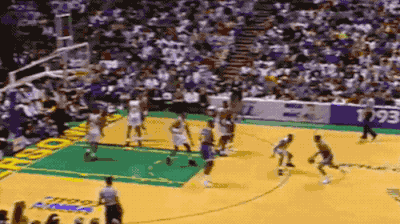
Nurse and the now-retired Kloppnburg were never on the same coaching staff. (The head coach Nurse replaced in Toronto, Dwane Casey, did overlap with Kloppenburg for one year as George Karl assistants in 1994-95). Still, it’s not hard to spot the parallels between the two men and their teams’ defensive systems. Both understood they needed to throw opponents off kilter to win the larger defensive war, even if it meant surrendering some easy buckets along the way. As Bernie Bickerstaff, the Sonics coach who initially hired Kloppenburg, told the Seattle Times in 1993, playing against Kloppenburg’s SOS defense “was like you were still picking something off you after the game.” They both make five defenders feel like 15.
Nearly three decades later, Nurse’s Raptors have translated the principles of those legendary Sonics defenses to the modern game. We don’t yet know if their haunted house defense is creative enough to take them all the way to the promised land again. Maybe, like Seattle’s style, it’s too gimmicky to ultimately triumph on its own.
But no matter the outcome, the Raptors have made the NBA a more interesting place. That’s the power of creativity and innovation.
0 notes